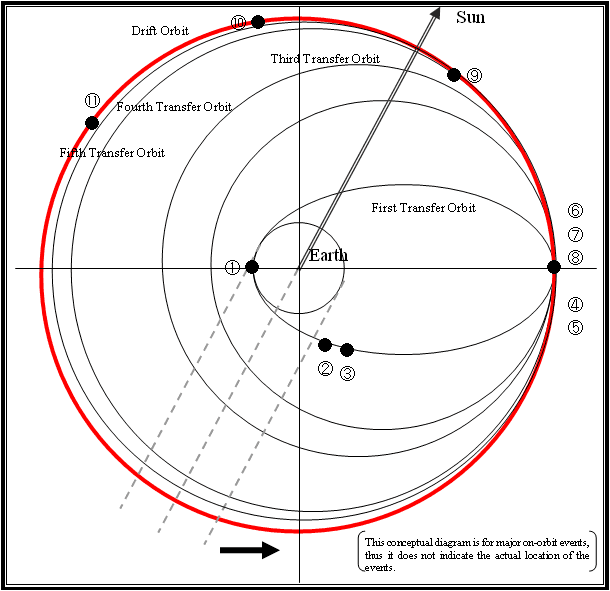Wideband InterNetworking engineering test and
Demonstration Satellite "KIZUNA" (WINDS)
Injection Result to the Drift Orbit
March 1, 2008 (JST)
Japan Aerospace Exploration Agency (JAXA)
Since the launch on February 23, 2008 (Japan Standard Time, JST,) the Japan Aerospace Exploration Agency (JAXA) has been maneuvering the KIZUNA (WINDS) to inject it into its drift orbit by firing the apogee engine and 20N thruster.
As a result of the orbit calculation after the 20N thruster firing, we have confirmed that the KIZUNA was injected into its scheduled drift orbit as follows.
| Result * | Schedule * | |
| Apogee altitude | 35,824 km | (35,822 km) |
| Perigee altitude | 35,192 km | (35,222 km) |
| Orbit inclination | 0.08 degrees | (0.09 degrees) |
| Period | 23hours and 41minutes | (23 hours and 42minutes) |
| Drift rate | 3.6 degrees/day East | (3.4 degrees/day East)
* Decimal fractions are rounded off.
|
The satellite is in good health.
We plan to start deploying the Multi-beam antennas (MBA) at around 12:47 p.m. on March 1 (JST.) The result of the deployment is scheduled to be announced at 4:30 p.m. on March 1 (JST.)
(Notes)
| - Transfer orbit: | A temporary orbit for a satellite between the launched orbit and its final orbit. After being launched and injected into a transfer orbit by the launch vehicle, the satellite is gradually maneuvered and injected into its final orbit. |
| - Drift orbit: | The last step orbit prior to the geostationary orbit. A circular orbit whose altitude is about 36,000 km. |
| - Drift rate: | the speed of a satellite moving in a longitudinal direction when looking at it from the Earth |
| - Multi-beam Antenna (MBA): | an antenna that can form a multiple number of beams |
|
|
Attachment

| Event | Revolution |
| 1. L/V second stage/KIZUNA separation 2. Solar array paddle deployment 3. Solar array paddle sun acquisition 4. First apogee engine firing 5. Second apogee engine firing 6. Third apogee engine firing 7. Fourth apogee engine firing
8. 20 N thruster firing
9. Multi-beam antenna (MBA) deployment10. Shifting to the three axis attitude control 11. Paddle rotation start |
1 1 1 2 4 6 7 9 10 10 10 |
KIZUNA Flight Plan